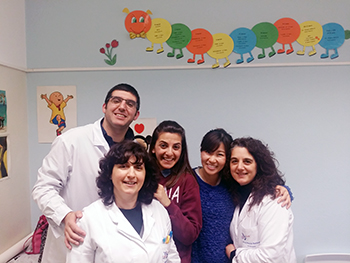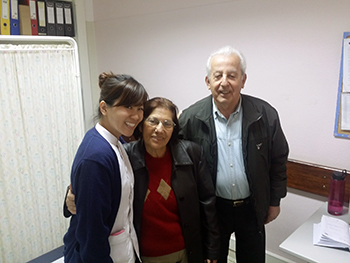Wu Cheng I, Fion
MPI Exchange student to Coimbra Nursing School, Portugal Internship in the Bachelor of Science in Nursing Programme


First of all, I would like to thank Macao Polytechnic Institute and Coimbra Nursing School for the opportunity to go to Portugal for clinical placement.
It was my first time in Portugal and I was a little bit worried since I could not speak nor understand the language. Fortunately, people in Portugal and the nurses in the health center were very nice.Whenever I did not understand or I had a confused look, they tried their best to help me in every single way.
In the blink of an eye, six weeks of internship were over. I was assigned to the Centro de Saúde de Celas for the clinical practice and I enjoyed it there. For most of the time, I participated in different services such as home care visits, vaccination programs and consultations about children’s health, woman’s health and family planning. Since I did not have any clinical practice in community health, I had only theoretical concepts from lectures and textbooks to start with. During the clinical internship, through observation, participation and communication, I developed a deeper understanding of the goals and functions of community health nursing. Besides that, I also joined some sessions of the health education program which greatly enriched my experience in Coimbra.
During this internship, I went and provided home care with the community health nurses a couple of times. I had not had any home care visits before, so the first time I merely observed the nurse while he prepared materials needed for home care visits and how he worked in a non-clinical setting environment. Then I assisted and later I was able to perform independently. For home visits,nurses usually perform wound care and give injections to clients. The clients are usually the ones who are not able to go to a health center for treatment due to poor physical conditions. In home care visits, chronic wounds such as diabetic wounds, pressure ulcers and venous leg ulcers are commonly seen. In each home visit, besides evaluating the wound and providing wound care to the client, nurses always assess the knowledge of the clients on their health conditions and give some health advices to them or the caregivers. After each visit, nurses document the treatments carefully and sometimes discuss with the head nurse and the doctor when the wounds are getting worse or whenthere are no signs of improvement. In addition to performing wound care, nurses also give injections to clients who need them. Home visits were an amazing experience for me and I learned a lot about chronic wounds.
Besides wound care, I also participated in the vaccination program. The vaccination program is aimed at enhancing the immunization and preventing certain diseases within the population. In the health center, there are guidelines about the vaccination schedules and the injection sites for the vaccination. I like this idea because it is common for infants to have two vaccines during each visit. With the guidelines, nurses know which vaccine creates which reaction to them. Although I was not allowed to give vaccinations to the infants and children, I still got a lot of opportunities to administer injections to adult clients under the supervision of my nurse.
In community health, consultation is a vital nursing service. Everyday, nurses provide consultation to different groups of the population in different areas such as infant and children’s health, woman’s health and family planning. For infants, the nurse measures their weight, height and the circumference of the head periodically to make sure they are growing properly over time. For adults, besides measuring the weight, height and the vital signs, nurses also ask questions and assess the clients’ awareness about their health. For example, for women’s health consultations, nurses would ask the clients about regular breast self-examinations and pap smear screening schedules. When necessary, nurses would provide education or counseling to them. For family planning, education about pregnancy, contraception, and infertility services is commonly provided. Despite that, consultation service is also available to other part of the population such as diabetic and hypertension clients.
Besides the clinical placement in the health center, I also got the chance to participate in a program called the “5 ao dia”. “5 ao dia” is a health education program which targets students in the first and second cycles of school in Coimbra and provides information on fruits and healthy diets. In the “5 ao dia” program, students participated in making fruit salad and tasted fruit juice when healthy fruits and relevant nutrition information were introduced to them. I noticed the students enjoyed this and learned a lot about healthy diets, and I think it is a very good method to introduce healthy fruits to the students.
In this internship, I enjoyed home care visits the most. I think it is very meaningful to provide health services for clients who are unable to access health care services and have difficulties taking care of themselves. Also, it allows vulnerable populations to enjoy health services. On the other hand, the hardest part for mew as the language. In community health nursing, communication and building a good relationship are very helpful when collecting data to identify existing or potential health problems of the clients. It is also vital to provide education or consultation to clients. Unfortunately I cannot speak Portuguese but luckily my nurses could speak English well and always translated for me. With this help in translation, I could understand the clients’ situations and increase my knowledge about community health.
At the end of my clinical internship, not only has my knowledge and experience in nursing become more consolidated and developed, I also got to experience a new culture and interact with great people. Overall I had a wonderful time there.


